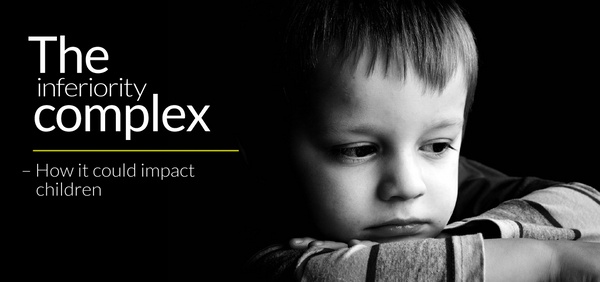How To Overcome Inferiority Complex In Children?
Posted on December 27 2016


We’ve often heard the term Inferiority Complex used in relation to different individuals, including children. It is a term that was first coined by Alfred Adler, the famous Australian medical doctor, psychotherapist, and founder of the school of Individual Psychology, in the 1920s.
According to Adler, we all experience feelings of inferiority as children and spend the rest of our lives trying to compensate for those feelings.
Since we are born as blank slates into the world, each child experiences this world's different wonders for the very first time. Needless to say, therefore, like all other phenomena, Inferiority Complex is a term or behavior that children are completely unfamiliar with at the outset. However, over the years with exposure to their respective environs and the resulting conditioning received as a result, can develop in them what Adler termed as Inferiority Complex.
Adler proposed that as children, we feel inferior to adults who are stronger and provide security.Therefore, if parents and elders continue to reinforce the belief that a child is in any way inferior to them, it can lead to the child not being able to overcome these childhood feelings of inferiority. This can prove to be highly damaging for the self worth of any child both in the immediate as well as distant future. Emotions such as feelings of inadequacy and lack of self confidence etc. can persist forever in such individuals leading to a belief of incompetence in themselves.
Almost all of the Inferiority Complex developed in young children has to do with parenting styles, teaching ways or peer behaviour towards a child.
In order to prevent a tendency of this sort breeding home in your child’s young mind, conscientious parents need to try and pick up the signs early on and then start with working on themselves:
- Showing your child down or not appreciating a child’s efforts is a big no-no! Instead, commending a child will go a long way in boosting your little one’s morale by leaps and bounds..
- Always keep from comparing your child with other kids or even siblings. Such comparisons may lead to demoralizing and undermining one child over the other which can lead to long term damaging effects of inferiority complex in your child. It’s exceedingly important to always remember that every child is unique and as parents one must encourage and nurture such uniqueness.
- Patience is key! Equating a child’s pace with your own or that of others is unrealistic and therefore, unfair. On the other hand, exercising patience and remaining calm when your child isn’t able to catch up, is of prime importance. This will reinforce your child’s confidence in her/his potential.
- While it’s important to teach your children the importance of excellence and that of making the most of their own potential, sneering at them if they’re unable to match up to your expectations, can lead to permanently denting their confidence.
- Always endeavour to build a space of trust around your child. If your child confides in you with her/his wrongdoing, appreciate the honesty rather than snapping at the child immediately. A loving home can be an open forum and safe haven for the child to discuss personal insecurities with you.
These are just some of the many ways that parents can adopt in order to prevent or remove the umpteen complexities ever occurring in your child, in the first place. It is parents' responsibility to hone their wards' talents and to provide a loving and nurturing environment for their kids to grow up in.
While you may have birthed your child, but she/he is an individual of their own. So, remember a child’s unique individuality must always be respected and cherished to enable children to be the best unique versions of themselves.
